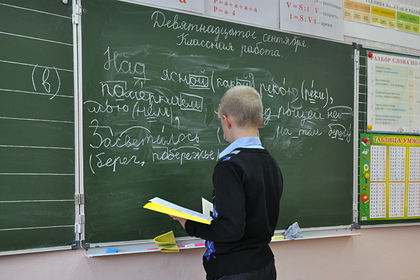The Ministry of Education has prepared a draft of new rules for spelling and punctuation of the Russian language 
The Ministry of Education has prepared a draft of new rules for spelling and punctuation of the Russian language. They will be updated for the first time since 1956. The corresponding document has been published on the portal of draft normative legal acts.
The rules of Russian spelling have not been updated for 65 yearsChanges were required due to updates in the language were not regulated, according to the document of the Ministry of Education. Inaccuracies and inconsistencies were also found in the current rules.
“The adoption of amendments, clarifications and additions to the spelling rules approved more than 60 years ago is a completely natural thing: the letter should, albeit with a lag, but still follow the language,” the Ministry of Education believes.
< p> Philologist, HSE associate professor Ilya Kukulin, in a conversation with Lenta.ru, agreed with the arguments of the Ministry of Education. He noted that changes in the language are a natural process, and the spelling rules do not affect it in any way.
Changing the spelling and punctuation rules does not mean changing the language. And the language changes without asking us.
Ilya Kukulinfilologist, Associate Professor at the Higher School of Economics
It is planned that the new rules will be finalized and adopted by the end of 2021.
The new rules will explain the spelling of some letters
They will determine the transmission of vowels and consonants in writing. In particular: vowels after sibilants and the letter “t”, and in other cases, as well as the spelling of unstressed vowels and unstressed vowels in the roots, especially the writing of individual roots. And also separately – the letters “b” and “b”. For example, the document says that the letter “e”, which is not at the beginning of the root after the consonants, is written to convey the vowel “e” and at the same time to indicate the hardness of the preceding consonant in a few common nouns of foreign language origin. Such as: laptop, mayor, master (teacher, master), plein air, peer, racketeer, rap, sir.
The new rules will describe the transmission of consonants in writing
Also, the new document will determine the transmission of voiceless and voiced consonants, special attention will be paid to the letter “y” and unpronounceable consonants, as well as the group of consonants at the junction of significant parts of the word, double consonants and the letter “г” at the end of -th (-it).
The new set of rules will clarify the merged, separate and hyphenated spelling of words
The new document will spell out the rules for using non-alphabetic characters when writing prepositions, repetitions, compound words, as well as the spelling of common nouns, geographical names, pseudonyms, nicknames and nicknames and compound names. For example, compound names, in which the second part is not a nickname, but a common noun in the role of an application, according to the new rules are written with a hyphen: Rockefeller Sr., Ilya the Prophet, Nikolai the Pleasant, Ivan Tsarevich, Ivanushka the Fool.
The spelling rules of official words, interjections and adverbs and the continuous or separate spelling of “not” will also be clarified. Also, the new document will update the rules for the hyphenation of words.
Changes in the Russian language are constantly occurring
In particular, the RAS recently compiled the “Dictionary of the Russian language of the coronavirus era” – it included about 3500 words, meanings and expressions that have appeared or were updated in Russian during the pandemic. For example, here you can find such words as “zoom”, “remote”, “covid-passport”, “anti-mask” and “glovetochnik”.
At the same time, the basic rules of the Russian language remain unchanged. Russians study the basics of spelling and punctuation at school. The Unified State Exam (USE) in the Russian language is the main one. Millions of schoolchildren take it every year. The average USE score in the Russian language in 2021 was 71.4, which is 0.2 points higher than a year ago.